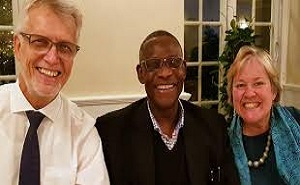Ecumenical relations in times of pandemic GENEVA
 Leaders of Christian World Communions discuss ‘being church’ in post-COVID societies
Leaders of Christian World Communions discuss ‘being church’ in post-COVID societies
(LWI) - How have the unprecedented challenges of the past year changed our Christian churches? How can our global communions respond together to the needs of a post COVID-19 world? How can we reshape our ecumenical relations to help us navigate through such uncertain times?
Those were among the questions under the spotlight as some thirty representatives of different global Christian communions gathered to share reports on their activities and discuss the impact of the pandemic on their congregations. The Conference of Secretaries of Christian World Communions (CS/CWC) has been meeting annually for over sixty years to reflect on ways of sharing the results of their bilateral and multilateral dialogues, as well as updates on their common witness and service.
Lutheran World Federation (LWF) General Secretary, Rev. Dr Martin Junge and Assistant General Secretary for Ecumenical Relations, Prof. Dr Dirk Lange, took part in the meeting on behalf of the global Lutheran communion. Rev. Dr Junge spoke about the need for solidarity and “prophetic defiance”, reflecting on what it means to adapt and “be church” at a time of pandemic, when so many people are unable to gather physically for worship and the sacraments, for fellowship and related activities.
Challenges and ecumenical opportunities
This year, the group was scheduled to meet in Nairobi, Kenya, but the ongoing consequences of the pandemic meant that participants had to gather virtually from 20 to 22 October. Established in 1957, the CS/CWC began as a forum for the mainline Anglican, Catholic, Orthodox and Protestant churches, but has since expanded to include a wide representation of Pentecostal, Evangelical, and other global Christian communities.
Despite the many difficulties that all churches are facing, participants reiterated a common desire to continue working together to increase understanding and make progress towards the goal of unity in the body of Christ.
Representatives of the different world communions highlighted both negative and positive opportunities presented by the pandemic. Some spoke of “zoom fatigue.” Many mentioned how online activities, be it worship or webinars, have allowed churches reach new audiences and include more people in global processes. Others explored the way the pandemic has highlighted existing crises including racism, poverty and inequality, as well as the challenge of religious freedom. Many pointed to Pope Francis’ new encyclical letter ‘Fratelli Tutti’ as a positive contribution to the building of a more just and compassionate global community.
It is exciting to explore other models of ecumenical discourse that take into account the global reality of the church.
— LWF Assistant General Secretary for Ecumenical Relations, Prof. Dr Dirk Lange
Practical service and prophetic witness
Highlighting the importance of service at this time, the Salvation Army’s ecumenical officer, Elizabeth Matear, underlined the need for flexibility and resilience in responding to the needs of people suffering from isolation and loss of livelihoods. She shared ways in which her community has been stepping up provision of food, medical supplies and hygiene kits to vulnerable communities, showcasing the practical response that all churches have been seeking to provide since the start of the pandemic.
The General Secretary of the Mennonite World Conference, César Garcìa, spoke of the way his community has been working to implement the report from the Trilateral Dialogue with Catholic and Lutheran churches. The question of how progress in theological agreements between different churches is received and brought to life within these world communions was acknowledged as a key challenge.
Bishop Ivan Abrahams, General Secretary of the World Methodist Council, discussed the consultation that his communion has begun with the African Instituted Churches. This process was recognized as increasingly important in forging a new hermeneutic for ecumenical dialogue that represents the changing shape of the global Christian communities.
LWF’s Prof. Dirk Lange said: “It is exciting to explore other models of ecumenical discourse that take into account the global reality of the church and a variety of pastoral and social challenges.”
Though the group does not pass resolutions or issue statements, it is seen as an important way of building trust and effective partnerships among the Church leaders and between their respective traditions, as well as fostering the coherence of the ecumenical movement worldwide.
Suorce: https://www.lutheranworld.org/

